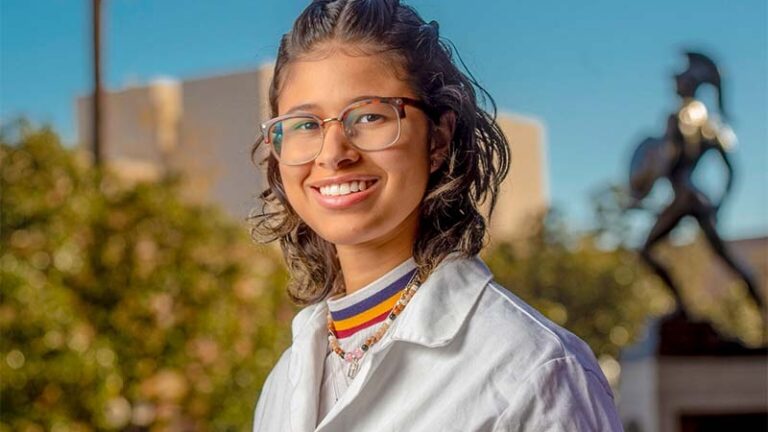
On National Donor Day, organ recipient breaks down misinformation
On New Year’s Day, Selah Kitchiner floated down Colorado Boulevard on a conveyance both dazzling and ephemeral. The purple and gold 2022 Donate Life Rose Parade float was covered in roses, sunflowers and seaweed with Venetian columns and arches that rose two stories.
Kitchiner, a junior majoring in psychology at the USC Dornsife College of Letters, Arts and Sciences, was just above street level, posing as a gondolier.
“I waved to anybody with a USC chair or sweatshirt, anybody who made eye contact,” Kitchiner said.
Her knack for connection has served her well in her quest to increase participation in organ donorship, especially in the Black community.
An opportunity to increase donorship
“As a Black woman, I’m prepared to make my case. I’m not necessarily asking people to become organ donors, but I am asking them to learn about it and get past the misinformation. There’s so much medical mistrust in the Black community, and it’s not unwarranted by any means.”
Kitchener is an ambassador for Donor Network West. She talks with high school students who are close to getting their driver licenses, a perfect time to consider signing up for organ donorship.
Kitchener hopes to help correct a disparity among organ donors and recipients. According to the U.S. Department of Health and Human Services, Office of Minority Health, the percentage of transplants performed on Black patients is lower when compared to white patients. In addition, people of color make up 60% of the national transplant waiting list.
“I’m trying to bust down that misinformation that might keep Black people from becoming organ donors,” Kitchiner said.
Hard realities for organ donation advocate
Kitchener has been facing hard realities most of her life. Her father suffered two bouts of cancer and didn’t survive the second one. She was diagnosed with end stage liver failure and underwent a transplant at age 13. She spent three months in a hospital before returning to school.
Emerging strong, she finished high school and headed for USC Dornsife, where she’s studying psychology on a pre-med track. Though it does not dominate her life, her status as an organ donor recipient is a guide.
“I think about my donor. If not for them, I wouldn’t have the chance to do any of this,” she said. “I take this seriously, to be an advocate, because I know the sacrifice that it takes to say yes.”